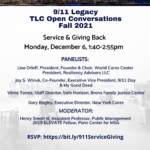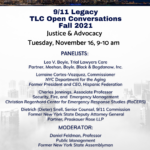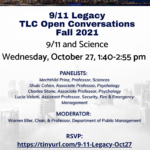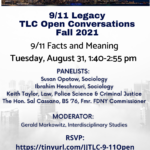Bookmark this page for quick access to TLC Open Conversation recordings and resources
Fall 2021
9/11 Legacy
This extraordinary series brings together researchers, advocates, & providers in conversations about the impact of 9/11 on our lives today, 20 years after the event. Recordings are linked below each event description and list of panelists and moderators.
9/11 Legacy: Service & Giving Back
December 6. 2021, 1:40-2:55 pm
This is the final panel discussion in this fall’s “9/11 Legacy Open Conversation” series co-sponsored with External Affairs. Our panelists have been exemplars of “Service and Giving Back” initiatives directly and indirectly related to 9/11 and represent professional directions to which many of our students aspire.
- Lisa Orloff, President, Founder & Chair, World Cares Center, President, Resiliency Advisors LLC
- Jay S. Winuk, Co-Founder, Executive Vice President, 9/11 Day & My Good Deed
- Vilma Torres, Staff Director, Safe Horizon, Bronx Family Justice Center
- Gary Bagley, Executive Director, New York Cares
- Henry Smart III, Assistant Professor, Public Management, 2019 ELEVATE Fellow, Penn Center for MSIs
Click here for the recording.
9/11 Legacy: Justice & Advocacy
November 16, 2021, 9-10 am (note time change) with Leo Boyle, Lorraine Cortés-Vásquez, Charles Jennings, Dietrich (Dieter) Snell, and Daniel Feldman
Join us for the third in our series of 9/11 Legacy Open Conversations, with a focus on Justice & Advocacy. This conversation brings together well-known 9/11 advocates who continue to lead and support efforts towards individual and community recovery and empowerment. Our panelists and moderator include:
Click here for the audio recording (video not available)
9/11 Legacy: 9/11 & Science
October 27, 2021 with Shuki Cohen, Mechtild Prinz, Charles Stone, Lucia Velotti, and Warren Eller
In partnership with the John Jay College of Criminal Justice Office of External Affairs, the John Jay Teaching & Learning Center presents a conversation about the influences of 9/11 on the sciences as we approach the 20th anniversary of this singular event. In light of current global concerns, this conversation may add to our understanding of where we were then and are now. Our distinguished panelists and moderator:
As a member of the Office of Chief Medical examiner DNA lab, Prinz worked on DNA identification of remains recovered at the WTC site and on the roofs of the surrounding buildings. Since then, the science of DNA identifications and a laboratory’s treatment of victims’ families and the lab’s own stressed out employees has changed for the better.
Charles Stone, Associate Professor, Psychology
Stone’s research focuses on how social influences (conversations, media, etc.) shape the way individuals and groups remember the past. His publications have dealt with the formation and maintenance of collective memories, mnemonic consequences of silence, intergenerational transmission of memories, the mnemonic consequences associated with denials, social media and jury deliberations.
Shuki Cohen, Associate Professor, Psychology
Cohen’s research examines the process of violent radicalization, including disinformation, propaganda, prejudice, conspiracy, and terrorism. His approach is linguistic. As a brain neuroscientist-turned-clinical psychologist he finds language to be the most proximal index to the mindset of the perpetrator, and his lab uses both computational and inductive methods to analyze it.
Lucia Velotti, Assistant Professor, Security, Fire, and Emergency Management
Velotti’s research centers on disaster response with an emphasis on developing community resilience. Her fieldwork has extended to multiple countries in examining early warning systems for natural disasters, effective disaster response planning, and the impact of disaster subcultures.
Warren Eller (moderator), Chair and Associate Professor, Public Management
Eller’s work has been funded by the Department of Homeland Security (DHS), the Department of Education (DoEd), the Federal Emergency Management Agency (FEMA), the National Science Foundation (NSF), the MacArthur Foundation, and various non-profit and public agencies. Currently, his research focuses on emergency management and recovery with special interest in vulnerable populations.
Click here for the recording.
9/11 Legacy: Facts & Meaning
August 31, 2021 with Salvatore Cassano, Keith Taylor, Susan Opotow, Ibrahim Bechrouri, and Gerald Markowitz
In partnership with the John Jay College of Criminal Justice Office of External Affairs, the John Jay Teaching & Learning Center presents a conversation about the impact and relevance of 9/11 as we approach the 20th anniversary of this singular event. In light of current global concerns, this conversation may add to our understanding of where we were then and are now. Our distinguished panelists and moderator:
-
- Former FDNY Commissioner the Honorable Salvatore Cassano (Panelist)
- Adjunct Assistant Professor and former Assistant Commissioner for the NYC Correction Department Keith Taylor (Panelist)
- Professor Susan Opotow (Panelist and author of New York After 9/11)
- Adjunct Lecturer and Geo-politics scholar Ibrahim Bechrouri (Panelist)
- Distinguished Professor Gerald Markowitz (Moderator)
Click here for the recording
Summer 2021
Digital Questions: Staying Safe and Human(e) in Virtual Spaces
Critical Engagement and Complex Social Issues
Digital Questions: What role does technology play in “reimagining public safety?”
August 18, 2021 with Eric Piza and Adam Scott Wandt
Description: Recent events have led to wide-spread dialogue revolving around the issue of “Reimagining Public Safety.” Such conversations have largely focused on police reform and shifting crime prevention resources away from law enforcement and towards community functions. The role of technology in reimagining public safety has received much less attention, despite the prominence of technology in the criminal justice system as well as everyday life. This panel discussion will take a critical look at the use of technology in public safety and explore its potential role in future reform efforts. Discussion topics will include: the human factors that determine the “success” of technology; how video surveillance technologies may provide data to advance the police reform agenda; advanced investigation tools for law enforcement; using technology to reduce or eliminate traffic stops; artificial intelligence systems that monitor the web for criminal and terrorist activity, and; the 4th amendment in the 21st century.
Click here for the recording
Memory and learning outcomes associated with living in a digital world
July 22, 2021 with Heath Grant and Charles B. Stone
Description: Over the last 20 or so years, social media, on the one hand, and virtual learning, on the other, have become increasingly powerful means through which individuals share their personal experiences with the world at large and educators are able to deliver their educational content, respectively. Critically, the coronavirus pandemic has only furthered our reliance on said digital domains. The present conversation will focus on how social media use may shape the way individuals remember their personal pasts and the possible learning costs and benefits associated with virtual classrooms.
Click for the Recording
Digital footprints, cybercrimes, and best practices
June 24, 2021 with Schweta Jain and Marie-Helen Maras
Description: Discussion questions include:
-
- What are “best practices” in data privacy?
- What’s wise to share and what not to share online,?
- How can we fine-tune privacy controls in cookies?
- How can we recognize threats such as Phishing?
Click here for the recording
Resources: TLC Open Conversation on Digital footprints, cybercrimes, and best practices





